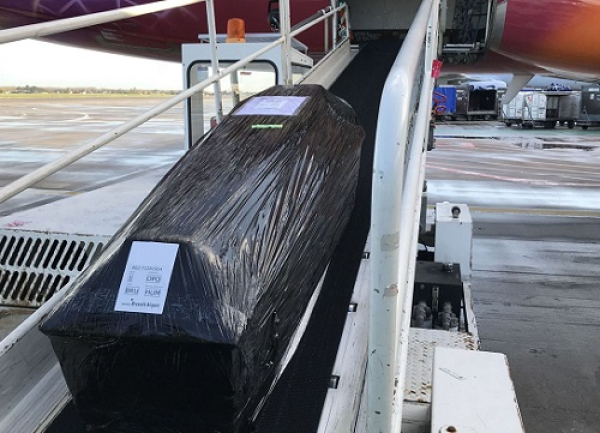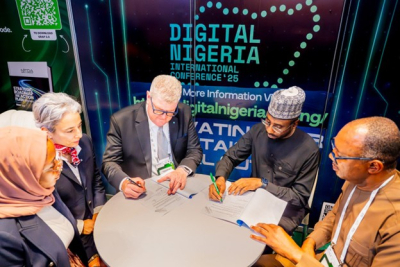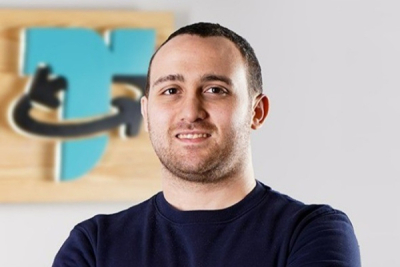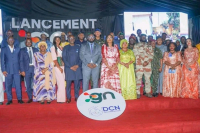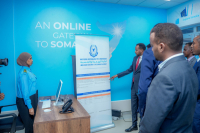The fintech company is positioning itself as an insurtech that combines cultural sensitivity, mobile accessibility, and blockchain technology to address a significant financial and social need.
Urban Ubuntu, a South African startup, has developed a digital solution specializing in funeral and repatriation insurance for the African diaspora. The company, founded in 2019 by Shingie Maramba, is beginning its service with the Kenyan community in South Africa.
"Funerals are often the biggest expense for diaspora families, costing US$7,000–US$10,000 per case. Families rely heavily on remittances, which can drain savings and delay burials. Traditional insurance providers lack cultural sensitivity, fast payouts, and mobile-first convenience," said Maramba.
The platform combines innovative technologies, including an AI that considers cultural rites to offer funeral services aligned with tradition, blockchain for transparency, and diaspora-friendly payment options compatible with M-Pesa, foreign exchange services, and banking apps.
To further streamline the process, Urban Ubuntu partners with Old Mutual for underwriting, AVBOB for repatriation logistics, Kenbright for 24/7 customer service, and KEDASA SACCO for product distribution.
Following its launch for the Kenyan market, the startup plans to expand to diaspora communities in the United States, Europe, and Australia. It also intends to deploy its services across the 14 African markets covered by its partner Old Mutual, where remittance flows exceed $30 billion annually.
"With US$5 billion in remittances flowing into Kenya annually, the founders saw an opportunity to redirect a portion of that into structured funeral cover that is affordable, customisable, and digital," Maramba added.
Adoni Conrad Quenum
• Mauritius launches $13M nationwide E-Health digital records project.
• "One patient, one file" system to unify medical data.
• UNDP partners; rollout underway with pilot hospital training.
Mauritius has launched a nationwide "E-Health" project to digitize medical records and modernize its public healthcare system. The large-scale initiative aims to improve the efficiency and quality of patient care through digital transformation.
Dubbed "E-Health," the project is built on the principle of "one patient, one file," which will provide every citizen with a single electronic medical record accessible across all hospitals and health centers. The rollout is already underway, with hospital staff receiving training at several pilot facilities. Authorities say the system will be highly secure and accessible only to authorized professionals, which is expected to reduce lost paper records and streamline patient care pathways.
The United Nations Development Programme (UNDP) is partnering on the initiative, which is estimated to cost 600 million Mauritian rupees, or nearly $13 million.The data will be housed in the government's national data center, protected by international security protocols and continuous monitoring. The system will also allow patients to access their records via an online portal and a mobile application, paving the way for more interactive and connected healthcare.
This project is part of a broader push to digitize public services in Mauritius. For several years, the government has pursued numerous e-government initiatives in areas ranging from civil registration to tax administration and business formalities. E-health is now a strategic pillar aimed at bolstering the quality and efficiency of services provided to citizens.
While the project faces challenges related to digital inclusion, particularly for the elderly or those less familiar with digital tools, it is expected to profoundly transform the relationship between patients and doctors. Simplified access to medical data, reduced administrative procedures, and optimized hospital management are all seen as key to building a more modern, transparent, and responsive healthcare system.
Samira Njoya
The University of Dar es Salaam, in partnership with China’s Zhejiang Normal University, has inaugurated the China-Africa Regional Cooperation Center for Digital Education, aimed at accelerating the integration of information and communication technologies (ICT) in African classrooms.
The new center, launched on September 2, will focus on improving digital literacy among teachers, especially in science, technology, engineering, and mathematics (STEM), and embedding ICT into school curricula in line with Tanzania’s revised education policy.
The China-Africa Regional Cooperation Center for Digital Education is expected to serve as a hub for training, research, and cross-border partnerships, advancing inclusive and innovative learning across Africa.
Without structured cooperation, cybercrime investigations remain fragmented, leaving gaps for attackers to exploit. This makes partnerships like the NITDA-Kaspersky MoU vital for strengthening Nigeria’s cyber defence capacity.
The National Information Technology Development Agency (NITDA) announced on September 3 that it has signed a Memorandum of Understanding (MoU) with global cybersecurity company Kaspersky to strengthen Nigeria’s cybersecurity ecosystem.
The agreement was formalised at GITEX Nigeria 2025 in Lagos, with NITDA’s Director General Kashifu Inuwa Abdullahi and Chris Norton, General Manager for Africa at Kaspersky, representing both parties.
Under the partnership, Kaspersky will support capacity-building programmes to develop local cyber talent, collaborate on public awareness campaigns such as NITDA’s Cybersecurity Alphabet initiative, and engage in joint research and analysis to boost nationwide cyber defence literacy.
The MoU also opens the door for intelligence sharing on threats and attacks targeting Nigerian citizens, government institutions, and digital infrastructure. In addition, Kaspersky will provide strategic advisory services to guide NITDA in developing frameworks and standards for securing the country’s critical information infrastructure, in line with President Bola Tinubu’s national security priorities.
Cybersecurity threats are on the rise in Nigeria, where digital adoption is accelerating. According to INTERPOL’s 2025 Africa Cyberthreat Assessment Report, cybercrime accounts for more than 30% of all reported crime in Western and Eastern Africa. Notable incidents have included hacks of Nigeria’s National Bureau of Statistics (NBS), while ransomware attacks alone surged to 3,459 cases in 2024. The report also revealed that cybercrime investigations increasingly depend on private sector collaboration, yet 89% of African countries said such cooperation needed “significant” or “some” improvement due to unclear engagement channels, low institutional readiness, and other barriers.
This challenge is highlighted by findings from the United Nations Economic Commission for Africa (UNECA), which estimates that weak cybersecurity preparedness costs African states an average of 10% of GDP—about $4 billion annually—due to cybercrime.
Recognizing this urgency, the Nigerian Communications Commission (NCC) has stressed the importance of public-private partnerships in building stronger cyber resilience. By working with telecom operators, internet service providers, and technology companies, the NCC is promoting information sharing, capacity building, and joint initiatives to counter rising cyber threats.
These findings underscore the significance of the NITDA-Kaspersky MoU. With cyber threats rising in scale and sophistication, the partnership represents a critical step toward building a resilient, collaborative, and globally competitive cybersecurity ecosystem in Nigeria and across Africa.
Hikmatu Bilali
Digital finance is rapidly evolving across Africa, driven by local initiatives that are reshaping how businesses and individuals interact with money. Young entrepreneurs are creating solutions tailored to the continent’s unique needs.
Amin Ben Abderrahman is a Tunisian entrepreneur at the forefront of Africa’s fintech sector. He is the co-founder and CEO of Konnect Networks, a start-up specializing in financial technology.
Founded in 2021, Konnect Networks aims to simplify complex financial flows and support the growth of businesses of all sizes through diversified, intuitive, and secure payment solutions.
The platform offers a range of services, including payment gateways, digital wallets, and financial inclusion tools. It enables individuals and businesses to send, receive, and manage payments in real time. Konnect supports transactions both online and in-person via instant payment links, e-commerce API integrations, QR code payments, and real-time notifications. Merchants benefit from an advanced administrative interface, multi-account management, and personalized support.
Konnect states, “We believe everyone should have equal access to financial opportunities. Our commitment is to promote inclusion by providing accessible financial solutions that enable individuals and businesses to access quality financial services, regardless of their background or location.”
Amin Ben Abderrahman earned an engineering degree in IT consulting and management from CY Tech in France in 2010. He began his career in 2012 at the Royal Bank of Scotland in Scotland as a quality manager for financial services.
In 2016, he joined Swiss fintech Leonteq as a risk and finance data specialist. The following year, he became a technical manager at Mars, the confectionery manufacturer. He then worked as a senior consultant for BeeSoSmart Consulting in Paris and later for OneStream, a fintech company based in the UK.
Melchior Koba
Mohammed Elhorishy, an entrepreneur with a background in finance, is leveraging technology to empower small and medium-sized enterprises (SMEs) in Egypt to operate more efficiently in the e-commerce sector.
Elhorishy is the co-founder and Managing Director of Taager, a business-to-business (B2B) e-commerce platform launched in 2019. Taager was founded by Abdelrahman Sherief, Ahmed Ismail, Ismail Omar, and Mohammed Elhorishy.
Taager provides a comprehensive digital infrastructure for SMEs across the Middle East and North Africa (MENA) region. This infrastructure encompasses sourcing, warehousing, logistics, and market linkage through its marketplace. The company emphasizes that Taager is pioneering a new model for B2B e-commerce in the MENA region, aiming to democratize online retail by offering integrated solutions that cover sourcing, logistics, and marketing, all fueled by data-driven innovation and a commitment to empowering entrepreneurs.
The startup facilitates the digital transition for retail players by offering an integrated solution. It aggregates suppliers, manages inventory through its warehouses, and handles distribution via its proprietary logistics service.
Elhorishy graduated from the British University in Egypt in 2012 with a Bachelor’s degree in Economics. He began his career in 2013 as a financial analyst at the Economic Group for Financial Consulting in Egypt. Subsequently, he joined Misr Financial Investments as an investment analyst. From 2015 to 2020, he was part of the private equity team at FEP Capital, an investment firm in Egypt.
This article was initially published in French by Melchior Koba
Adapted in English by Ange Jason Quenum
• Guinea launches .gn domain under national control
• Move ends decades of foreign management by PSGNet
• Part of “Simandou 2040” plan to boost digital economy
Guinea has formally launched its national top-level domain, .gn, ending decades of management from abroad and marking a step toward digital sovereignty.
The extension, first introduced in 1994 and until recently administered by UK-based PSGNet, will now be managed locally by the National Agency for State Digitalization (ANDE), the government said Sept. 4. Sub-domains such as .com.gn for businesses, .gov.gn for government, and .edu.gn for schools will provide greater visibility and credibility for national institutions online.
Officials said the move aligns with Guinea’s long-term “Simandou 2040” strategy, which aims to leverage the country’s vast mineral wealth for sustainable growth while placing digital infrastructure at the center of economic diversification. The government expects the localized domain management to strengthen cybersecurity, encourage e-commerce and digital services, and reinforce the country’s identity in the global internet space.
Samira Njoya
• Somalia launches national e-visa platform to simplify travel.
• System integrates security checks, boosts fiscal transparency.
• The move aligns with EAC integration and digital reforms.
Somalia has rolled out a national electronic visa platform as part of its broader digital transformation drive, the government said.
The portal, launched on Sept. 1 and accessible via evisa.gov.so, allows travelers to apply online without visiting embassies. Developed with support from the International Organization for Migration, the system integrates security checks and centralized monitoring to better control entry amid ongoing security concerns linked to Al-Shabaab.
Officials said visa fees will now be collected directly into state accounts, strengthening fiscal transparency and supporting public finances. The government also hopes the e-visa will improve investor confidence, support the country’s nascent tourism industry, and facilitate regional integration as Somalia prepares to finalize its accession to the East African Community.
The launch follows other recent digital initiatives, including a national QR code standard for mobile payments and the introduction of wearable NFC-enabled devices for contactless transactions.
This article was initially published in French by Samira Njoya
Adapted in English by Ange Jason Quenum
The platform aims to solve the problems of fragmented financial services, slow transactions, and monthly payment limits.
Zepay, a fintech solution developed by a Nigerian startup, allows users to pay bills, make bank transfers, and earn loyalty points that can be converted into cashback or discounts, all with no transaction limits. The company was founded in 2025 by Daniel Charles-Iyoha.
“Our differentiation lies in zero transaction limits, reward-based engagement, and a future-ready investment layer,” said Charles-Iyoha.
The platform integrates core banking functionalities through partnerships with a Nigerian bank and a local fintech company. Zepay is also preparing to launch savings and investment options, including stocks and mutual funds.
“Early traction includes successful MVP deployment, integration of core banking features, and partnership activations,” Charles-Iyoha stated. “While exact user numbers aren’t public yet, we’re seeing growing engagement through our app ecosystem, with promising retention driven by the rewards system.”
Adoni Conrad Quenum
- Zimbabwe, Huawei discuss expanding ICT talent development cooperation
- Plans include digital training center aligned with 2030 strategy
- No formal deal signed; talks follow prior LinkedIn, UAE partnerships
The Zimbabwean government is looking to deepen its cooperation with Huawei to develop digital talent, a key topic during discussions on Monday, September 1, between President Emmerson Mnangagwa and senior officials from the Chinese technology company during an official visit to China.
The proposed collaboration includes expanding investments in ICT talent and establishing a digital training center. This initiative aligns with Zimbabwe’s national digital transformation strategy for 2030, where one of the three main pillars is the development of digital skills and capacity building. The government has previously identified the lack of ICT skills and low digital literacy as major challenges to the country's digital transformation.
In response, Zimbabwe has sought out multiple partnerships. In August 2024, the government signed an exploratory agreement with LinkedIn to develop the digital skills of civil servants and young people through the "LinkedIn Learning" platform. In April 2025, a program to train 1.5 million citizens in programming and artificial intelligence was launched with support from the United Arab Emirates as part of the “Zimbabwe Digital Skills Program.”
During that program's launch, authorities said they wanted to lay “the foundations for a future-oriented workforce proficient in cutting-edge technologies.” The World Bank estimates that 230 million jobs in sub-Saharan Africa will require digital skills by 2030. Zimbabwe faces high rates of unemployment and underemployment, particularly among young people, with the unemployment rate estimated at 35% in 2021.
While Huawei has stated it “remains committed to playing a central role in Zimbabwe’s digitalization agenda,” no new formal agreement has been signed or announced at this time.
Isaac K. Kassouwi
More...
As a marketing graduate, she chose to innovate in the digital space. She is focused on digitizing the healthcare sector, with a particular emphasis on services for women.
Thato Schermer is a South African entrepreneur and co-founder of Zoie Health, a digital clinic focused on women’s health and wellness.
Founded in 2021 by Schermer and Nonie Sitole, Zoie Health provides virtual consultations, a community forum, specialized resources, and an online pharmacy for ordering medications and other health products. Its services cover family planning, fertility, maternity, and mental health.
In 2024, Schermer also co-founded Yola, a subscription-based startup that offers access to health and wellness providers through a WhatsApp and AI-powered platform. Yola primarily targets workplace healthcare.
A graduate of the University of Cape Town with a bachelor’s degree in marketing and economics, Schermer began her career in 2013 as a client business development intern at Procter & Gamble in South Africa. In 2014, she joined the World Bank Group as an intern before becoming a management consultant at McKinsey & Company the following year.
In 2016, she was named Executive Associate to the CEO of Discovery Vitality, a program that encourages employees to adopt healthier behaviors. From 2018 to 2019, she worked at Life Healthcare, serving as both Chief of Staff to the CEO and Head of Strategy and Business Development.
Melchior Koba
The research initiative represents a strategic launchpad toward a digital future that empowers citizens and transforms sectors across the economy.
Nigeria will launch 75 new research projects on October 1, 2025, as part of a broader push to deepen its digital ecosystem, foster innovation, and establish the country as a leading tech hub in Africa.
Minister of Communications and Digital Economy, Bosun Tijani, announced the plan at GITEX Nigeria 2025 being held from September 1-4. The initiative, coordinated by the National Information Technology Development Agency (NITDA), targets researchers, startups, corporates, and the Nigerian diaspora.
“On October 1, there will be a research scheme that will support another 75 research projects. Such investments will reinforce Nigeria’s position in the global digital economy,” Tijani said. He added that startups and corporates should leverage government support to contribute to national and global innovation.
Tijani emphasized that robust digital infrastructure is now a vital national priority. He called for a shift in strategy beyond catching up with others to fostering resilient systems that sustain long-term innovation.
The October 1 research rollout continues a legacy of impactful initiatives from NITDA. In 2022, NITDA launched a blockchain scholarship program in partnership with Domineum Blockchain Solutions, training 30,000 Nigerians in blockchain technologies and offering top participants incubation opportunities in London.
At the 2024 Digital Nigeria Innovation Challenge, NITDA awarded ₦16 million in prizes. Top winner InfraMappers developed an AI-powered mapping solution to optimize healthcare facility distribution nationwide.
NITDA’s Research & Development Department, established in 2022, actively promotes emerging technologies — including AI, blockchain, and IoT — through collaboration, funding, and commercialization strategies. These successes underscore NITDA’s capacity for maximizing impact through research investments.
By investing in targeted research — especially in AI, fintech, e-health, and agri-tech — Nigeria can accelerate homegrown innovation that addresses real-world needs and boosts global competitiveness.
Supporting researchers, startups, and diaspora talent positions Nigeria to build a more inclusive and resilient digital ecosystem. The October research initiative represents a strategic launchpad toward a digital future that empowers citizens and transforms sectors across the economy.
Hikmatu Bilali
MEST Africa, in partnership with Absa, has launched the MEST Africa Challenge (MAC) 2025, a Pan-African pitch competition for early-stage technology startups. The programme offers entrepreneurs access to equity funding, strategic networks, and global visibility, with the winner set to receive $50,000 in equity funding.
The 2025 edition focuses on fintech and related value chains, with solutions spanning payments, alternative lending, fraud detection, agri-tech, insurtech, and super-apps. Eligible startups must be less than three years old, generate at least $5,000 in monthly recurring revenue for six months, and have raised no more than $1 million in cumulative funding.
Applicants must operate in Botswana, Uganda, Mauritius, Seychelles, Kenya, Mozambique, Zambia, or Ghana, with at least two co-founders. Applications close on 26 September 2025.
By establishing a direct payment framework with TikTok, GCB could eliminate inefficiencies, ensure creators keep more of their earnings, and unlock new opportunities in the fast-growing digital economy
Ghana Commercial Bank (GCB) has proposed a new payment framework aimed at ensuring Ghanaian TikTok creators receive their earnings seamlessly and securely. The initiative was tabled during a courtesy call on September 2 by a GCB delegation, led by Chief of Staff Abraham Ferguson, to the Minister for Communication, Digital Technology, and Innovations, Hon. Samuel Nartey George (MP).
The bank positioned itself as a potential official payment gateway for TikTok payouts in Ghana, citing its extensive infrastructure and readiness to support the creative economy. According to Ferguson, GCB’s connectivity with global payment networks such as MasterCard and Visa, alongside its ability to process payouts through MoMo wallets and direct bank accounts, makes it well-placed to manage cash-outs and gift revenues for creators. He noted, “The bank's primary aim is to find a way for Ghanaians to get paid for their content and manage cash-outs for gifts received.”
Hon. Samuel Nartey George strongly endorsed the proposal during the meeting, which also included TikTok’s West Africa representative, Ms. Tokumbo Ibrahim. He argued that routing creator payments through GCB Bank would eliminate reliance on costly third-party intermediaries, allowing Ghanaian talent to retain more of their earnings.
For TikTok, Ms. Ibrahim committed to reviewing the feasibility of the partnership. Should the proposal move forward, GCB Bank said it is prepared to immediately begin technical and regulatory processes to establish a direct connection with TikTok. This would include setting up integration teams and formalising a framework with relevant financial authorities.
The move comes at a time when TikTok is experiencing rapid growth in Africa, becoming a major platform for young creators to build audiences and monetize content. In Ghana, TikTok has not only reshaped entertainment but also created new opportunities in advertising, influencer marketing, and e-commerce. However, one of the biggest challenges remains ensuring creators can access their earnings in a transparent, cost-effective way.
TikTok’s growing influence in West Africa makes the proposed GCB Bank partnership particularly significant. The region now accounts for 41.5 million active TikTok users — 2.6% of the global total, according to Datareportal— making it the second-largest TikTok market in Africa after Northern Africa (5.7%). This underscores the platform’s massive role in shaping digital culture and entrepreneurship across the subregion.
For Ghanaian creators, a localized payment framework could unlock a share of this fast-expanding market, ensuring they are not disadvantaged compared to peers in Nigeria, Kenya, or South Africa who already benefit from more established payout systems. If implemented, the GCB-TikTok collaboration could strengthen Ghana’s position as a hub in the regional digital economy, enabling creators to monetize effectively and tap into the IFC-forecasted $712 billion contribution Africa’s digital economy could add to GDP by 2050.
Hikmatu Bilali


